Analysis of HRM Practices in UK Service Industries (HND)
VerifiedAdded on 2020/11/23
|15
|2785
|146
Report
AI Summary
This report examines Human Resource Management (HRM) practices within the service industry, specifically focusing on Travelodge Hotels in the UK. It delves into the recruitment processes, analyzing job descriptions, specifications, and comparing selection processes across different service industries. The report highlights the role of training and development programs, identifying challenges faced by Travelodge and offering recommendations for improvement. Key areas covered include the impact of HRM on organizational performance, employee relations, and the influence of economic and political factors on recruitment. The report provides an overview of HRM functions, barriers to staff training, and strategies for cost-effective recruitment, aiming to provide insights into effective HRM practices in the hospitality sector.
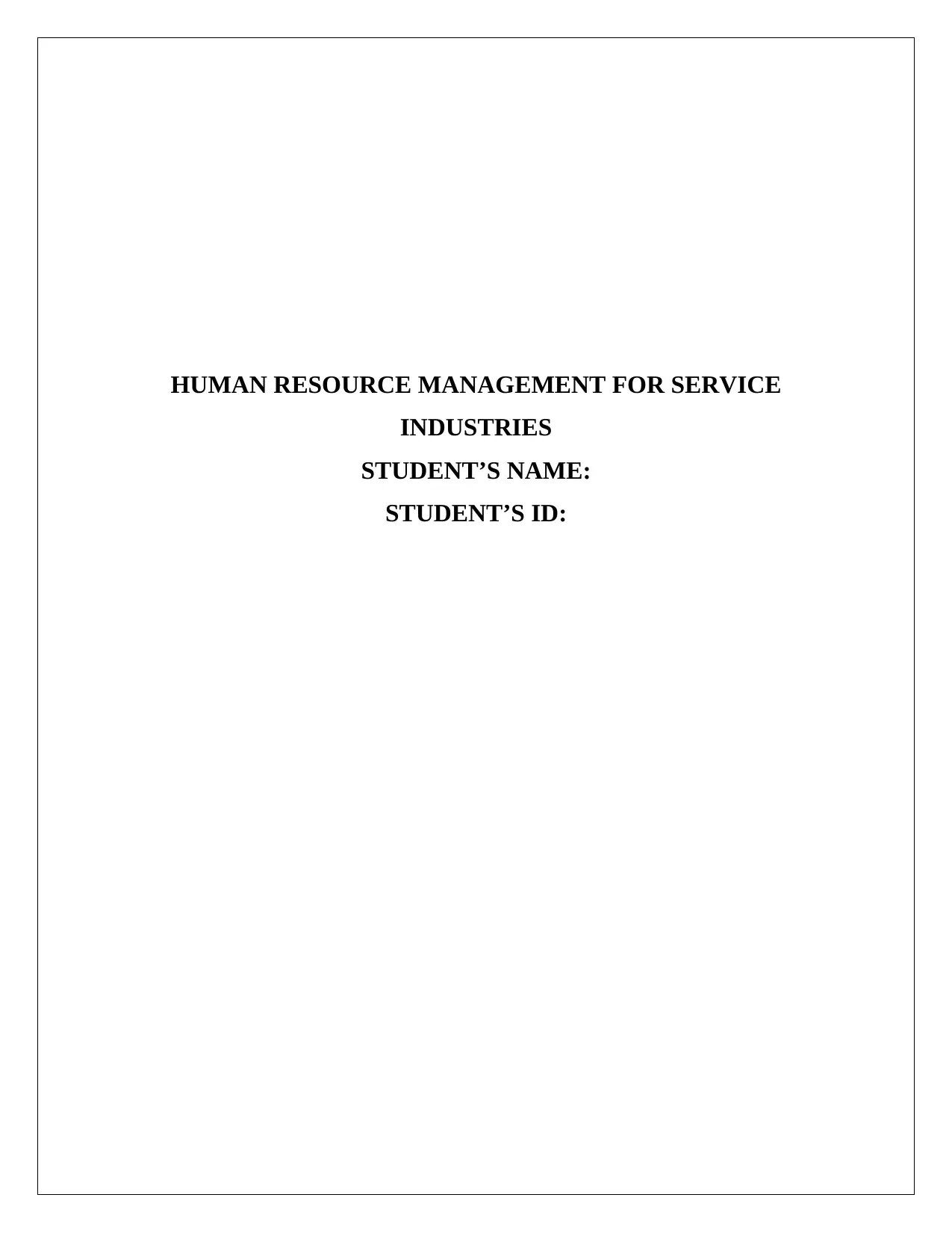
HUMAN RESOURCE MANAGEMENT FOR SERVICE
INDUSTRIES
STUDENT’S NAME:
STUDENT’S ID:
INDUSTRIES
STUDENT’S NAME:
STUDENT’S ID:
Paraphrase This Document
Need a fresh take? Get an instant paraphrase of this document with our AI Paraphraser
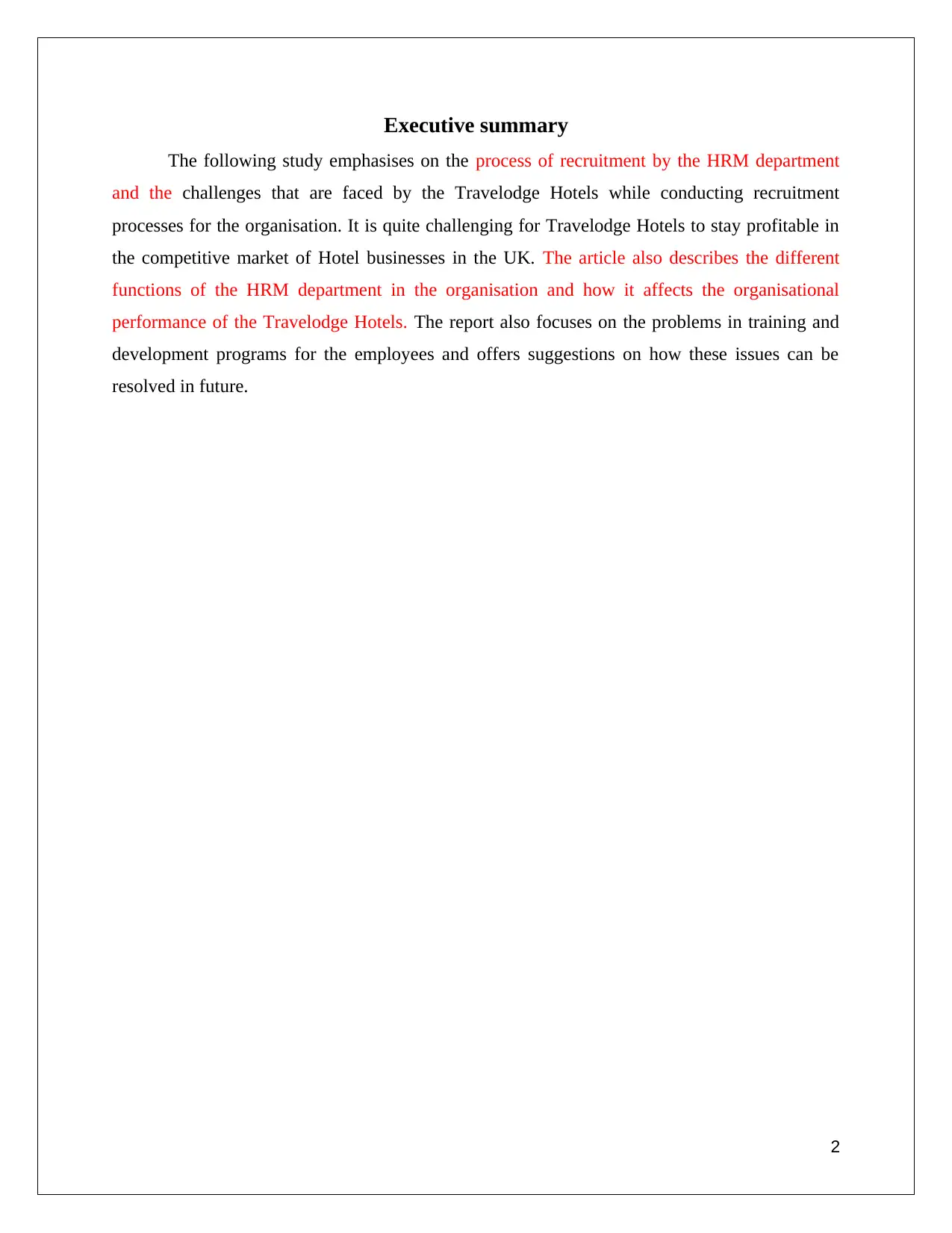
Executive summary
The following study emphasises on the process of recruitment by the HRM department
and the challenges that are faced by the Travelodge Hotels while conducting recruitment
processes for the organisation. It is quite challenging for Travelodge Hotels to stay profitable in
the competitive market of Hotel businesses in the UK. The article also describes the different
functions of the HRM department in the organisation and how it affects the organisational
performance of the Travelodge Hotels. The report also focuses on the problems in training and
development programs for the employees and offers suggestions on how these issues can be
resolved in future.
2
The following study emphasises on the process of recruitment by the HRM department
and the challenges that are faced by the Travelodge Hotels while conducting recruitment
processes for the organisation. It is quite challenging for Travelodge Hotels to stay profitable in
the competitive market of Hotel businesses in the UK. The article also describes the different
functions of the HRM department in the organisation and how it affects the organisational
performance of the Travelodge Hotels. The report also focuses on the problems in training and
development programs for the employees and offers suggestions on how these issues can be
resolved in future.
2
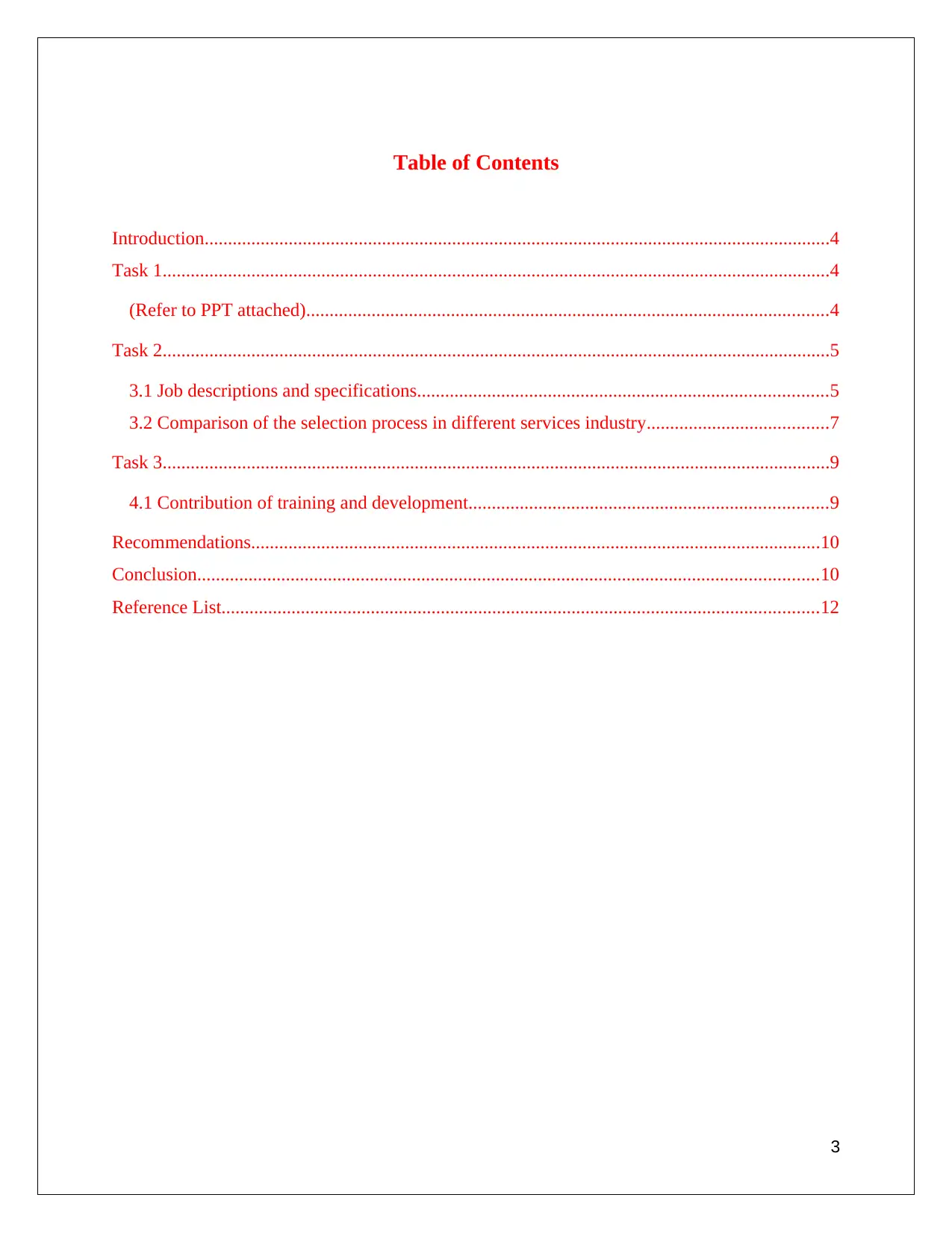
Table of Contents
Introduction......................................................................................................................................4
Task 1...............................................................................................................................................4
(Refer to PPT attached)................................................................................................................4
Task 2...............................................................................................................................................5
3.1 Job descriptions and specifications........................................................................................5
3.2 Comparison of the selection process in different services industry.......................................7
Task 3...............................................................................................................................................9
4.1 Contribution of training and development.............................................................................9
Recommendations..........................................................................................................................10
Conclusion.....................................................................................................................................10
Reference List................................................................................................................................12
3
Introduction......................................................................................................................................4
Task 1...............................................................................................................................................4
(Refer to PPT attached)................................................................................................................4
Task 2...............................................................................................................................................5
3.1 Job descriptions and specifications........................................................................................5
3.2 Comparison of the selection process in different services industry.......................................7
Task 3...............................................................................................................................................9
4.1 Contribution of training and development.............................................................................9
Recommendations..........................................................................................................................10
Conclusion.....................................................................................................................................10
Reference List................................................................................................................................12
3
⊘ This is a preview!⊘
Do you want full access?
Subscribe today to unlock all pages.

Trusted by 1+ million students worldwide
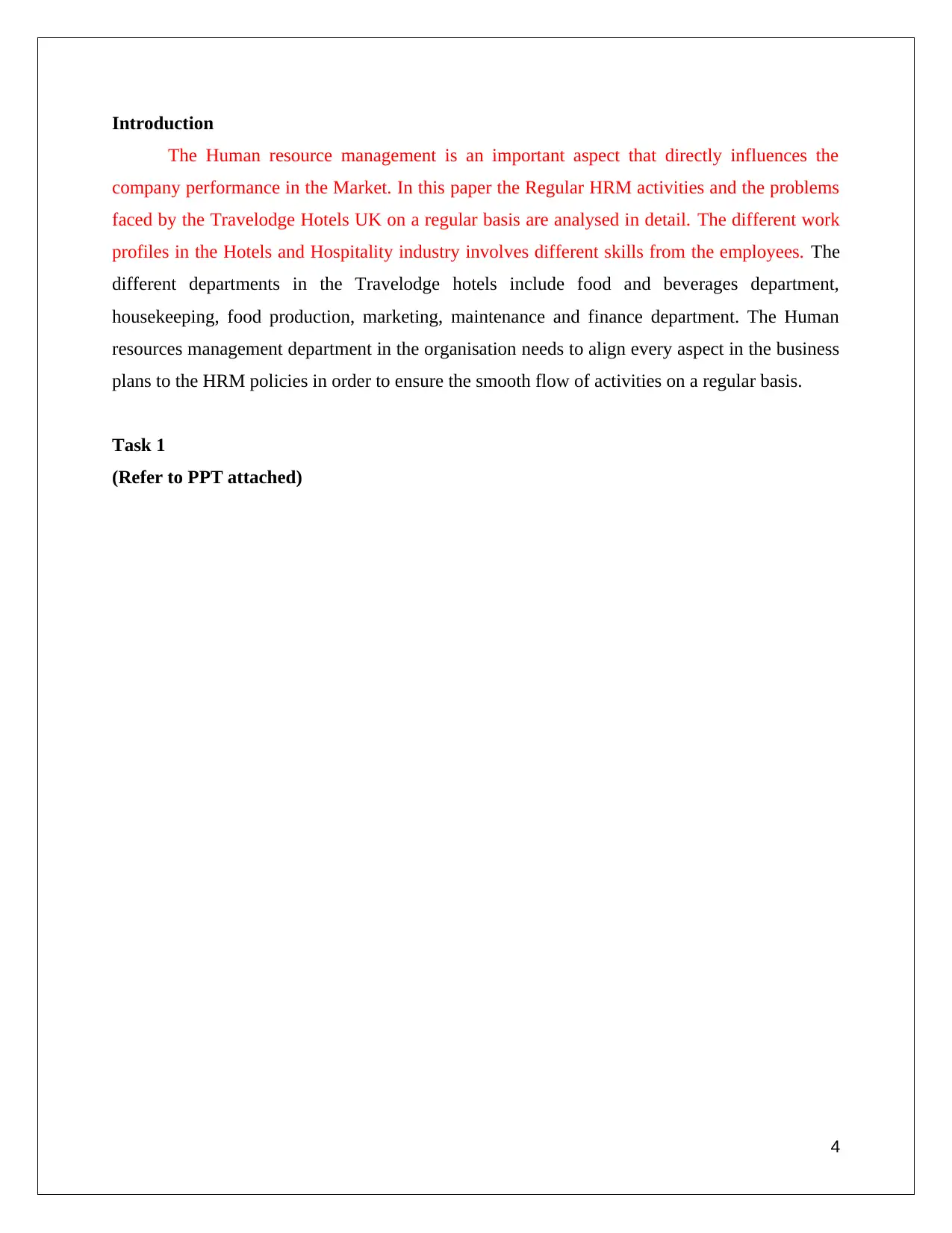
Introduction
The Human resource management is an important aspect that directly influences the
company performance in the Market. In this paper the Regular HRM activities and the problems
faced by the Travelodge Hotels UK on a regular basis are analysed in detail. The different work
profiles in the Hotels and Hospitality industry involves different skills from the employees. The
different departments in the Travelodge hotels include food and beverages department,
housekeeping, food production, marketing, maintenance and finance department. The Human
resources management department in the organisation needs to align every aspect in the business
plans to the HRM policies in order to ensure the smooth flow of activities on a regular basis.
Task 1
(Refer to PPT attached)
4
The Human resource management is an important aspect that directly influences the
company performance in the Market. In this paper the Regular HRM activities and the problems
faced by the Travelodge Hotels UK on a regular basis are analysed in detail. The different work
profiles in the Hotels and Hospitality industry involves different skills from the employees. The
different departments in the Travelodge hotels include food and beverages department,
housekeeping, food production, marketing, maintenance and finance department. The Human
resources management department in the organisation needs to align every aspect in the business
plans to the HRM policies in order to ensure the smooth flow of activities on a regular basis.
Task 1
(Refer to PPT attached)
4
Paraphrase This Document
Need a fresh take? Get an instant paraphrase of this document with our AI Paraphraser
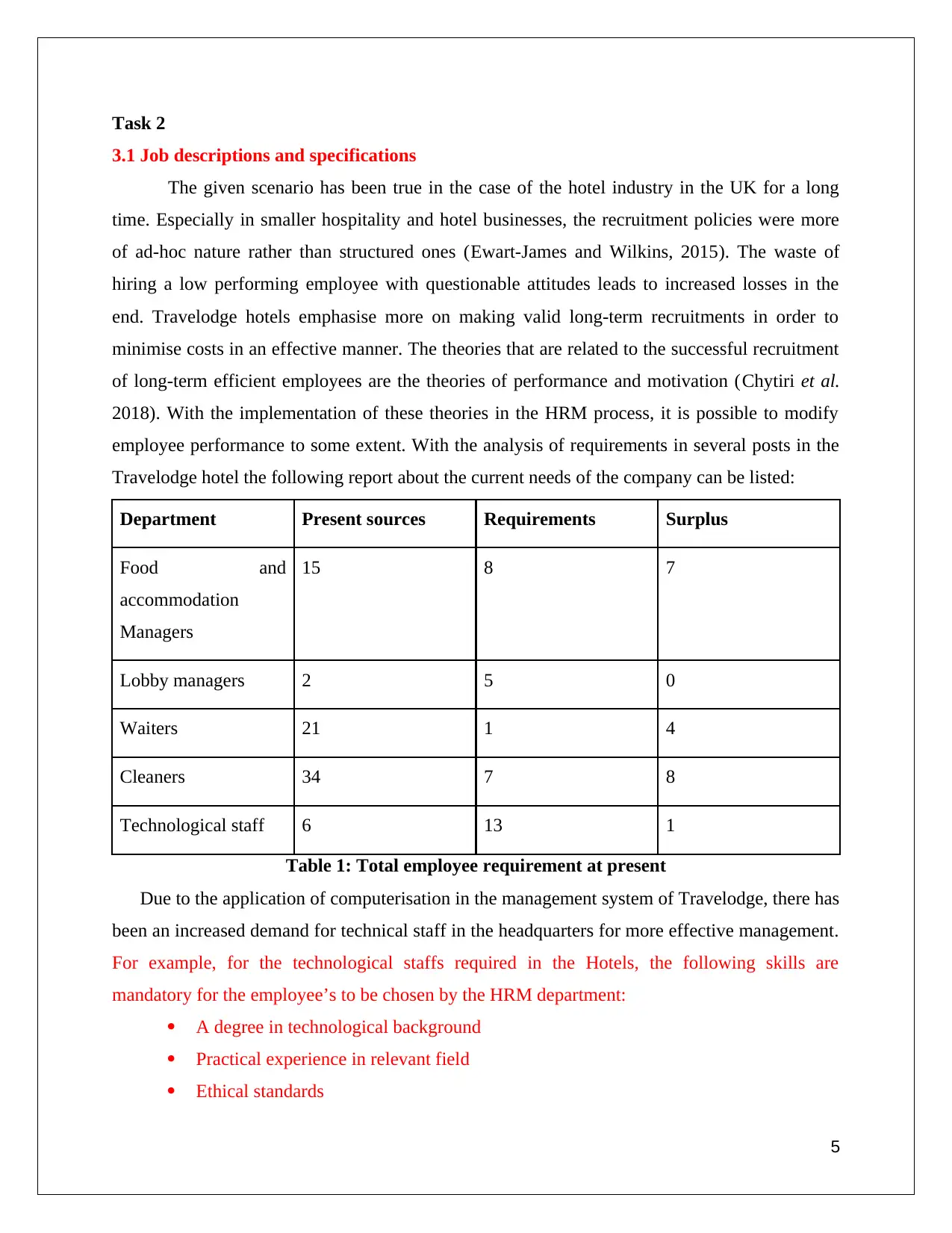
Task 2
3.1 Job descriptions and specifications
The given scenario has been true in the case of the hotel industry in the UK for a long
time. Especially in smaller hospitality and hotel businesses, the recruitment policies were more
of ad-hoc nature rather than structured ones (Ewart-James and Wilkins, 2015). The waste of
hiring a low performing employee with questionable attitudes leads to increased losses in the
end. Travelodge hotels emphasise more on making valid long-term recruitments in order to
minimise costs in an effective manner. The theories that are related to the successful recruitment
of long-term efficient employees are the theories of performance and motivation (Chytiri et al.
2018). With the implementation of these theories in the HRM process, it is possible to modify
employee performance to some extent. With the analysis of requirements in several posts in the
Travelodge hotel the following report about the current needs of the company can be listed:
Department Present sources Requirements Surplus
Food and
accommodation
Managers
15 8 7
Lobby managers 2 5 0
Waiters 21 1 4
Cleaners 34 7 8
Technological staff 6 13 1
Table 1: Total employee requirement at present
Due to the application of computerisation in the management system of Travelodge, there has
been an increased demand for technical staff in the headquarters for more effective management.
For example, for the technological staffs required in the Hotels, the following skills are
mandatory for the employee’s to be chosen by the HRM department:
A degree in technological background
Practical experience in relevant field
Ethical standards
5
3.1 Job descriptions and specifications
The given scenario has been true in the case of the hotel industry in the UK for a long
time. Especially in smaller hospitality and hotel businesses, the recruitment policies were more
of ad-hoc nature rather than structured ones (Ewart-James and Wilkins, 2015). The waste of
hiring a low performing employee with questionable attitudes leads to increased losses in the
end. Travelodge hotels emphasise more on making valid long-term recruitments in order to
minimise costs in an effective manner. The theories that are related to the successful recruitment
of long-term efficient employees are the theories of performance and motivation (Chytiri et al.
2018). With the implementation of these theories in the HRM process, it is possible to modify
employee performance to some extent. With the analysis of requirements in several posts in the
Travelodge hotel the following report about the current needs of the company can be listed:
Department Present sources Requirements Surplus
Food and
accommodation
Managers
15 8 7
Lobby managers 2 5 0
Waiters 21 1 4
Cleaners 34 7 8
Technological staff 6 13 1
Table 1: Total employee requirement at present
Due to the application of computerisation in the management system of Travelodge, there has
been an increased demand for technical staff in the headquarters for more effective management.
For example, for the technological staffs required in the Hotels, the following skills are
mandatory for the employee’s to be chosen by the HRM department:
A degree in technological background
Practical experience in relevant field
Ethical standards
5
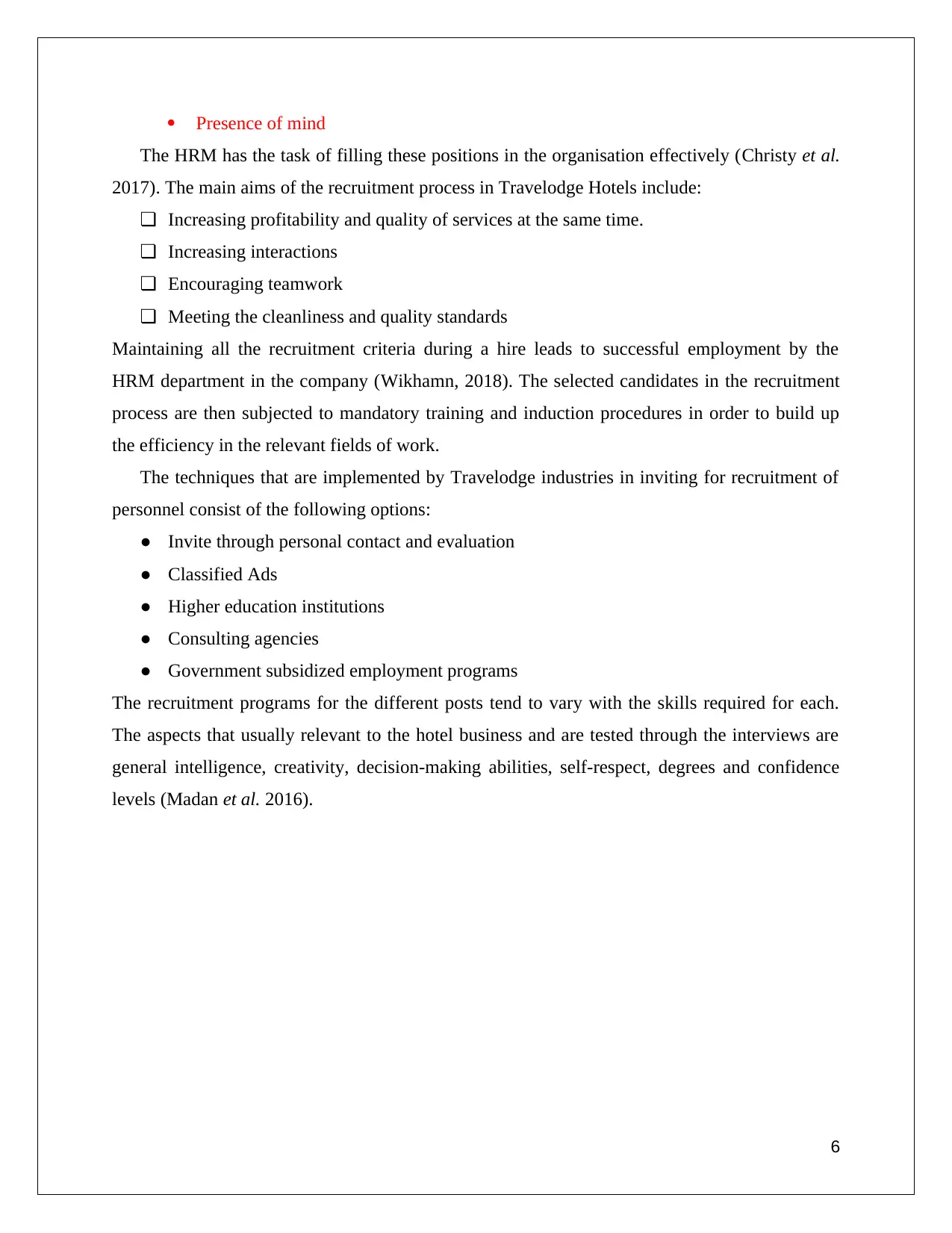
Presence of mind
The HRM has the task of filling these positions in the organisation effectively (Christy et al.
2017). The main aims of the recruitment process in Travelodge Hotels include:
❏ Increasing profitability and quality of services at the same time.
❏ Increasing interactions
❏ Encouraging teamwork
❏ Meeting the cleanliness and quality standards
Maintaining all the recruitment criteria during a hire leads to successful employment by the
HRM department in the company (Wikhamn, 2018). The selected candidates in the recruitment
process are then subjected to mandatory training and induction procedures in order to build up
the efficiency in the relevant fields of work.
The techniques that are implemented by Travelodge industries in inviting for recruitment of
personnel consist of the following options:
● Invite through personal contact and evaluation
● Classified Ads
● Higher education institutions
● Consulting agencies
● Government subsidized employment programs
The recruitment programs for the different posts tend to vary with the skills required for each.
The aspects that usually relevant to the hotel business and are tested through the interviews are
general intelligence, creativity, decision-making abilities, self-respect, degrees and confidence
levels (Madan et al. 2016).
6
The HRM has the task of filling these positions in the organisation effectively (Christy et al.
2017). The main aims of the recruitment process in Travelodge Hotels include:
❏ Increasing profitability and quality of services at the same time.
❏ Increasing interactions
❏ Encouraging teamwork
❏ Meeting the cleanliness and quality standards
Maintaining all the recruitment criteria during a hire leads to successful employment by the
HRM department in the company (Wikhamn, 2018). The selected candidates in the recruitment
process are then subjected to mandatory training and induction procedures in order to build up
the efficiency in the relevant fields of work.
The techniques that are implemented by Travelodge industries in inviting for recruitment of
personnel consist of the following options:
● Invite through personal contact and evaluation
● Classified Ads
● Higher education institutions
● Consulting agencies
● Government subsidized employment programs
The recruitment programs for the different posts tend to vary with the skills required for each.
The aspects that usually relevant to the hotel business and are tested through the interviews are
general intelligence, creativity, decision-making abilities, self-respect, degrees and confidence
levels (Madan et al. 2016).
6
⊘ This is a preview!⊘
Do you want full access?
Subscribe today to unlock all pages.

Trusted by 1+ million students worldwide
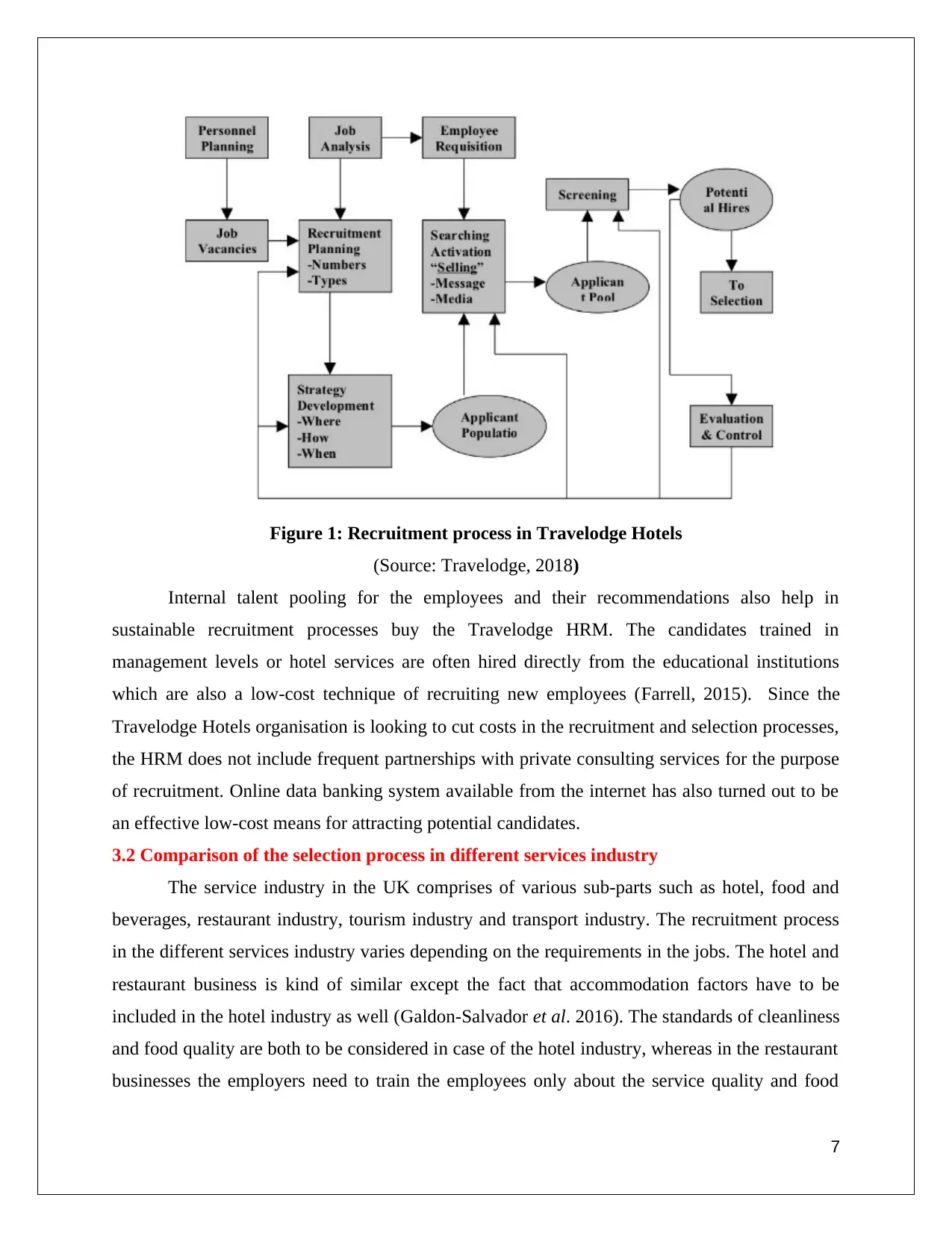
Figure 1: Recruitment process in Travelodge Hotels
(Source: Travelodge, 2018)
Internal talent pooling for the employees and their recommendations also help in
sustainable recruitment processes buy the Travelodge HRM. The candidates trained in
management levels or hotel services are often hired directly from the educational institutions
which are also a low-cost technique of recruiting new employees (Farrell, 2015). Since the
Travelodge Hotels organisation is looking to cut costs in the recruitment and selection processes,
the HRM does not include frequent partnerships with private consulting services for the purpose
of recruitment. Online data banking system available from the internet has also turned out to be
an effective low-cost means for attracting potential candidates.
3.2 Comparison of the selection process in different services industry
The service industry in the UK comprises of various sub-parts such as hotel, food and
beverages, restaurant industry, tourism industry and transport industry. The recruitment process
in the different services industry varies depending on the requirements in the jobs. The hotel and
restaurant business is kind of similar except the fact that accommodation factors have to be
included in the hotel industry as well (Galdon-Salvador et al. 2016). The standards of cleanliness
and food quality are both to be considered in case of the hotel industry, whereas in the restaurant
businesses the employers need to train the employees only about the service quality and food
7
(Source: Travelodge, 2018)
Internal talent pooling for the employees and their recommendations also help in
sustainable recruitment processes buy the Travelodge HRM. The candidates trained in
management levels or hotel services are often hired directly from the educational institutions
which are also a low-cost technique of recruiting new employees (Farrell, 2015). Since the
Travelodge Hotels organisation is looking to cut costs in the recruitment and selection processes,
the HRM does not include frequent partnerships with private consulting services for the purpose
of recruitment. Online data banking system available from the internet has also turned out to be
an effective low-cost means for attracting potential candidates.
3.2 Comparison of the selection process in different services industry
The service industry in the UK comprises of various sub-parts such as hotel, food and
beverages, restaurant industry, tourism industry and transport industry. The recruitment process
in the different services industry varies depending on the requirements in the jobs. The hotel and
restaurant business is kind of similar except the fact that accommodation factors have to be
included in the hotel industry as well (Galdon-Salvador et al. 2016). The standards of cleanliness
and food quality are both to be considered in case of the hotel industry, whereas in the restaurant
businesses the employers need to train the employees only about the service quality and food
7
Paraphrase This Document
Need a fresh take? Get an instant paraphrase of this document with our AI Paraphraser
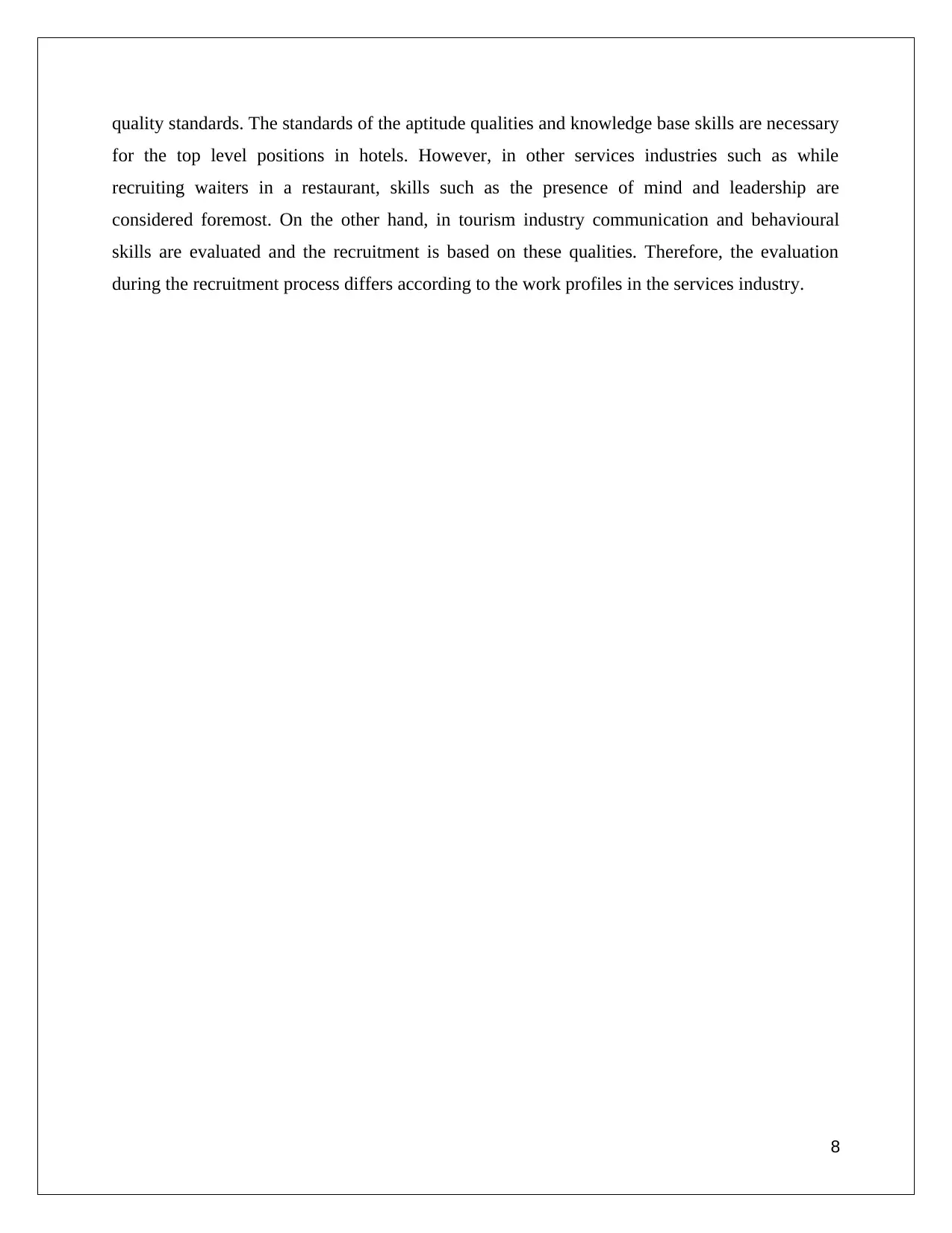
quality standards. The standards of the aptitude qualities and knowledge base skills are necessary
for the top level positions in hotels. However, in other services industries such as while
recruiting waiters in a restaurant, skills such as the presence of mind and leadership are
considered foremost. On the other hand, in tourism industry communication and behavioural
skills are evaluated and the recruitment is based on these qualities. Therefore, the evaluation
during the recruitment process differs according to the work profiles in the services industry.
8
for the top level positions in hotels. However, in other services industries such as while
recruiting waiters in a restaurant, skills such as the presence of mind and leadership are
considered foremost. On the other hand, in tourism industry communication and behavioural
skills are evaluated and the recruitment is based on these qualities. Therefore, the evaluation
during the recruitment process differs according to the work profiles in the services industry.
8
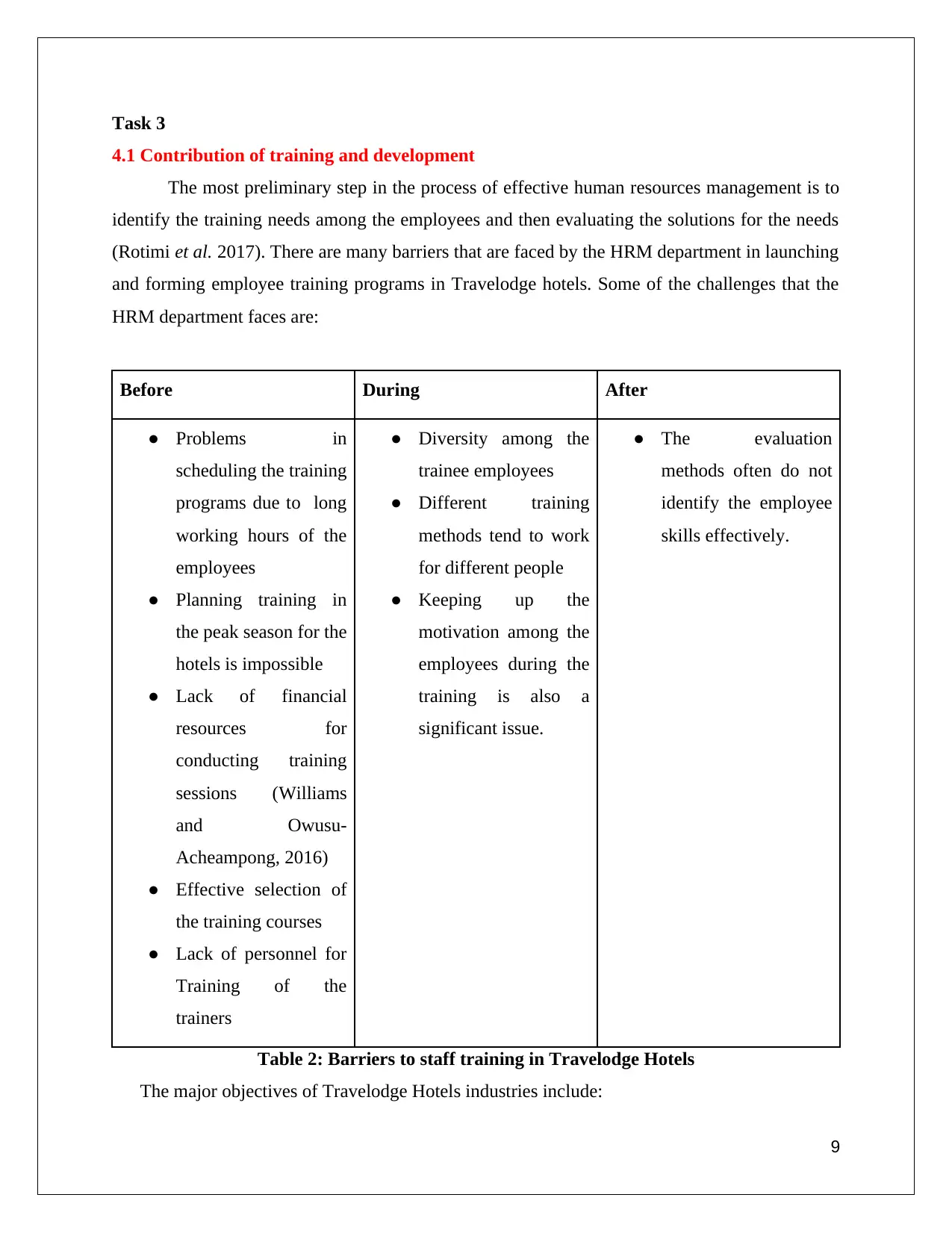
Task 3
4.1 Contribution of training and development
The most preliminary step in the process of effective human resources management is to
identify the training needs among the employees and then evaluating the solutions for the needs
(Rotimi et al. 2017). There are many barriers that are faced by the HRM department in launching
and forming employee training programs in Travelodge hotels. Some of the challenges that the
HRM department faces are:
Before During After
● Problems in
scheduling the training
programs due to long
working hours of the
employees
● Planning training in
the peak season for the
hotels is impossible
● Lack of financial
resources for
conducting training
sessions (Williams
and Owusu-
Acheampong, 2016)
● Effective selection of
the training courses
● Lack of personnel for
Training of the
trainers
● Diversity among the
trainee employees
● Different training
methods tend to work
for different people
● Keeping up the
motivation among the
employees during the
training is also a
significant issue.
● The evaluation
methods often do not
identify the employee
skills effectively.
Table 2: Barriers to staff training in Travelodge Hotels
The major objectives of Travelodge Hotels industries include:
9
4.1 Contribution of training and development
The most preliminary step in the process of effective human resources management is to
identify the training needs among the employees and then evaluating the solutions for the needs
(Rotimi et al. 2017). There are many barriers that are faced by the HRM department in launching
and forming employee training programs in Travelodge hotels. Some of the challenges that the
HRM department faces are:
Before During After
● Problems in
scheduling the training
programs due to long
working hours of the
employees
● Planning training in
the peak season for the
hotels is impossible
● Lack of financial
resources for
conducting training
sessions (Williams
and Owusu-
Acheampong, 2016)
● Effective selection of
the training courses
● Lack of personnel for
Training of the
trainers
● Diversity among the
trainee employees
● Different training
methods tend to work
for different people
● Keeping up the
motivation among the
employees during the
training is also a
significant issue.
● The evaluation
methods often do not
identify the employee
skills effectively.
Table 2: Barriers to staff training in Travelodge Hotels
The major objectives of Travelodge Hotels industries include:
9
⊘ This is a preview!⊘
Do you want full access?
Subscribe today to unlock all pages.

Trusted by 1+ million students worldwide
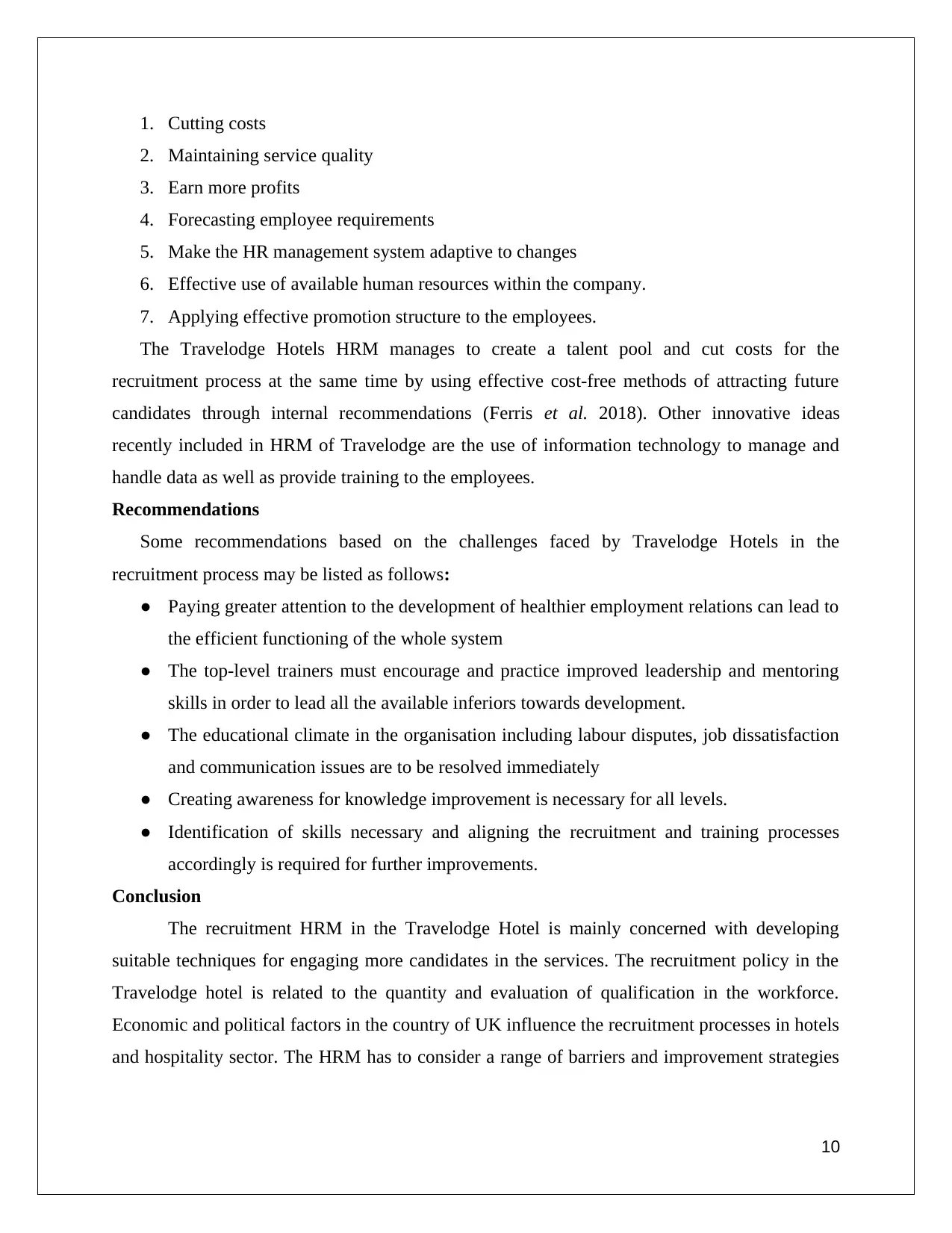
1. Cutting costs
2. Maintaining service quality
3. Earn more profits
4. Forecasting employee requirements
5. Make the HR management system adaptive to changes
6. Effective use of available human resources within the company.
7. Applying effective promotion structure to the employees.
The Travelodge Hotels HRM manages to create a talent pool and cut costs for the
recruitment process at the same time by using effective cost-free methods of attracting future
candidates through internal recommendations (Ferris et al. 2018). Other innovative ideas
recently included in HRM of Travelodge are the use of information technology to manage and
handle data as well as provide training to the employees.
Recommendations
Some recommendations based on the challenges faced by Travelodge Hotels in the
recruitment process may be listed as follows:
● Paying greater attention to the development of healthier employment relations can lead to
the efficient functioning of the whole system
● The top-level trainers must encourage and practice improved leadership and mentoring
skills in order to lead all the available inferiors towards development.
● The educational climate in the organisation including labour disputes, job dissatisfaction
and communication issues are to be resolved immediately
● Creating awareness for knowledge improvement is necessary for all levels.
● Identification of skills necessary and aligning the recruitment and training processes
accordingly is required for further improvements.
Conclusion
The recruitment HRM in the Travelodge Hotel is mainly concerned with developing
suitable techniques for engaging more candidates in the services. The recruitment policy in the
Travelodge hotel is related to the quantity and evaluation of qualification in the workforce.
Economic and political factors in the country of UK influence the recruitment processes in hotels
and hospitality sector. The HRM has to consider a range of barriers and improvement strategies
10
2. Maintaining service quality
3. Earn more profits
4. Forecasting employee requirements
5. Make the HR management system adaptive to changes
6. Effective use of available human resources within the company.
7. Applying effective promotion structure to the employees.
The Travelodge Hotels HRM manages to create a talent pool and cut costs for the
recruitment process at the same time by using effective cost-free methods of attracting future
candidates through internal recommendations (Ferris et al. 2018). Other innovative ideas
recently included in HRM of Travelodge are the use of information technology to manage and
handle data as well as provide training to the employees.
Recommendations
Some recommendations based on the challenges faced by Travelodge Hotels in the
recruitment process may be listed as follows:
● Paying greater attention to the development of healthier employment relations can lead to
the efficient functioning of the whole system
● The top-level trainers must encourage and practice improved leadership and mentoring
skills in order to lead all the available inferiors towards development.
● The educational climate in the organisation including labour disputes, job dissatisfaction
and communication issues are to be resolved immediately
● Creating awareness for knowledge improvement is necessary for all levels.
● Identification of skills necessary and aligning the recruitment and training processes
accordingly is required for further improvements.
Conclusion
The recruitment HRM in the Travelodge Hotel is mainly concerned with developing
suitable techniques for engaging more candidates in the services. The recruitment policy in the
Travelodge hotel is related to the quantity and evaluation of qualification in the workforce.
Economic and political factors in the country of UK influence the recruitment processes in hotels
and hospitality sector. The HRM has to consider a range of barriers and improvement strategies
10
Paraphrase This Document
Need a fresh take? Get an instant paraphrase of this document with our AI Paraphraser
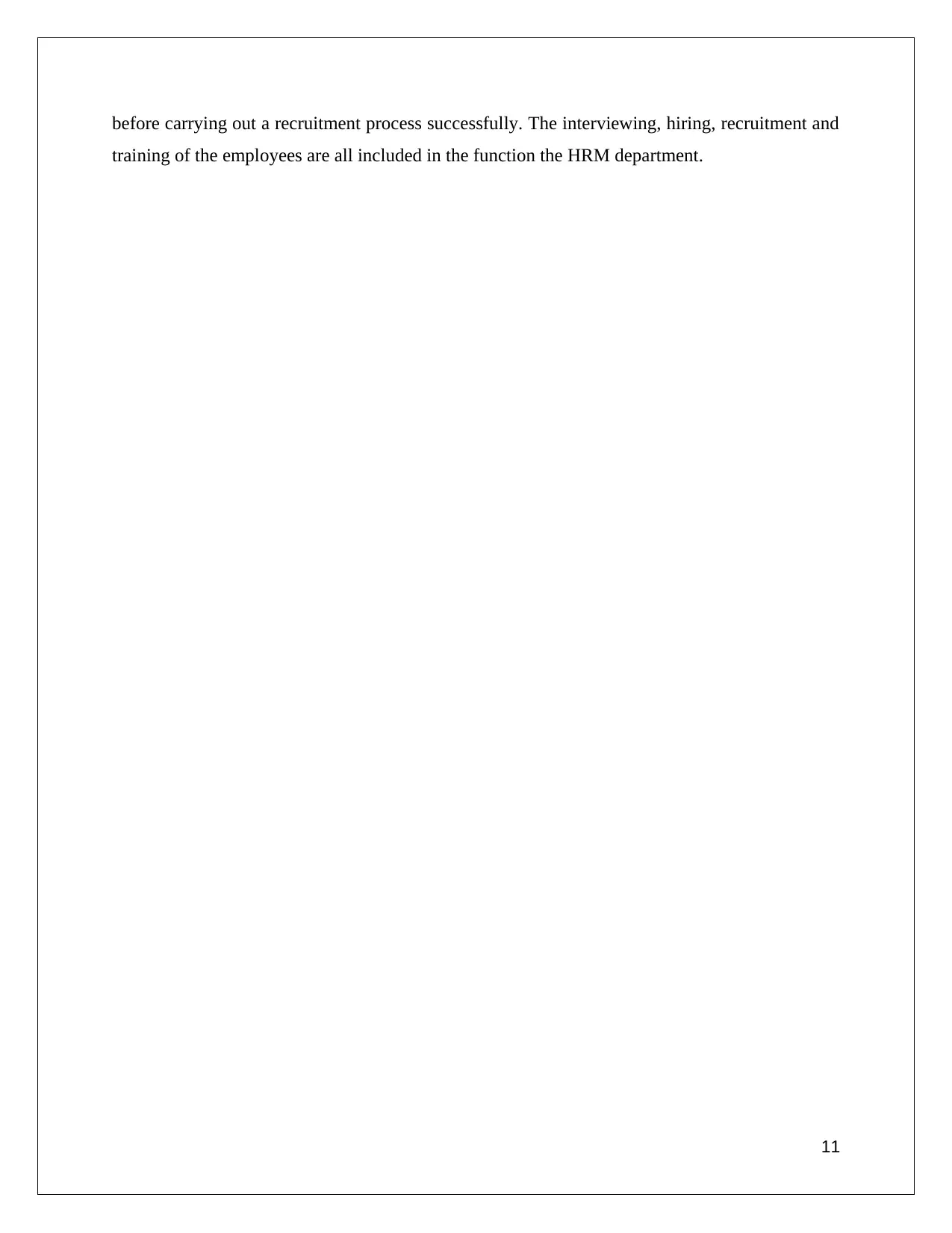
before carrying out a recruitment process successfully. The interviewing, hiring, recruitment and
training of the employees are all included in the function the HRM department.
11
training of the employees are all included in the function the HRM department.
11
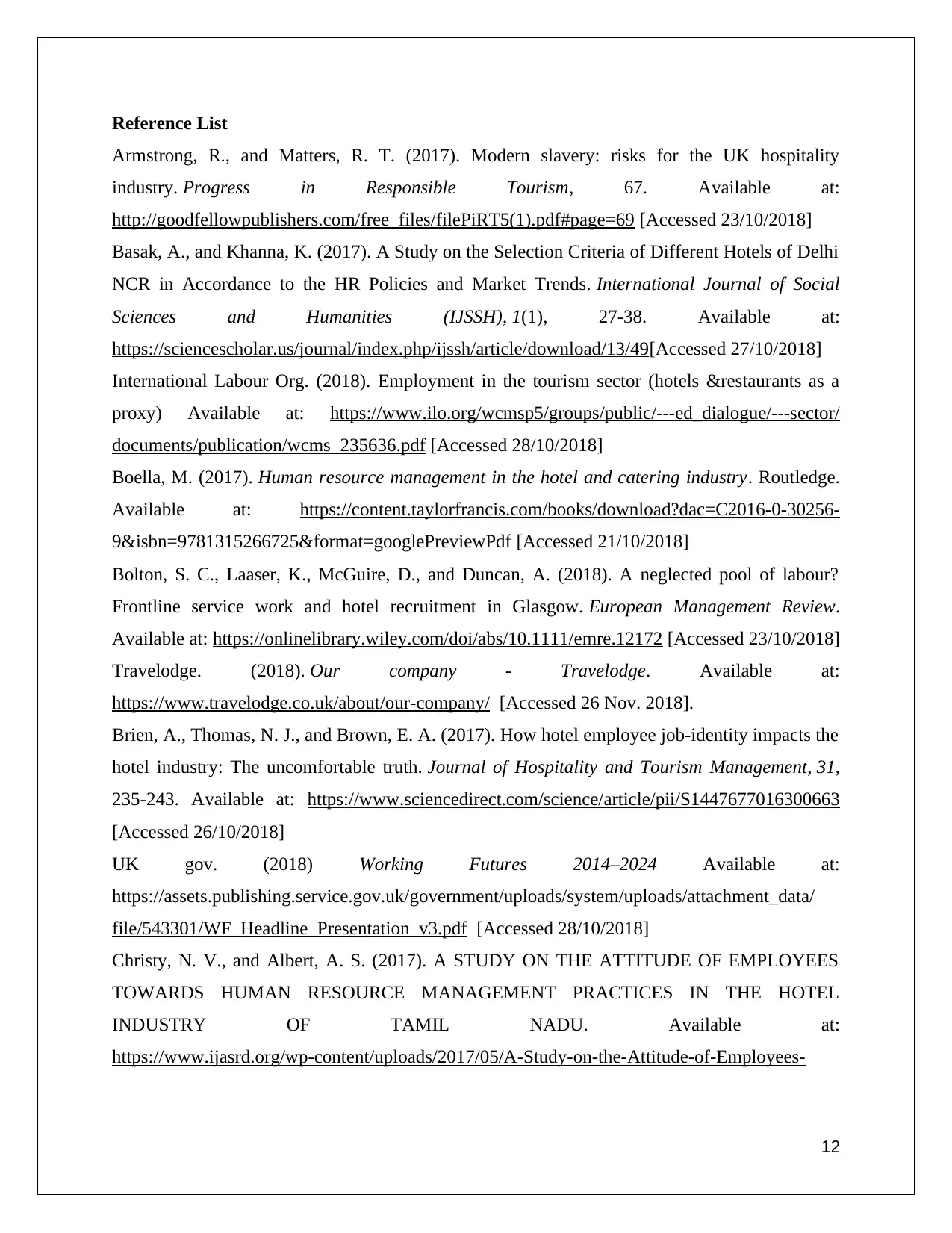
Reference List
Armstrong, R., and Matters, R. T. (2017). Modern slavery: risks for the UK hospitality
industry. Progress in Responsible Tourism, 67. Available at:
http://goodfellowpublishers.com/free_files/filePiRT5(1).pdf#page=69 [Accessed 23/10/2018]
Basak, A., and Khanna, K. (2017). A Study on the Selection Criteria of Different Hotels of Delhi
NCR in Accordance to the HR Policies and Market Trends. International Journal of Social
Sciences and Humanities (IJSSH), 1(1), 27-38. Available at:
https://sciencescholar.us/journal/index.php/ijssh/article/download/13/49[Accessed 27/10/2018]
International Labour Org. (2018). Employment in the tourism sector (hotels &restaurants as a
proxy) Available at: https://www.ilo.org/wcmsp5/groups/public/---ed_dialogue/---sector/
documents/publication/wcms_235636.pdf [Accessed 28/10/2018]
Boella, M. (2017). Human resource management in the hotel and catering industry. Routledge.
Available at: https://content.taylorfrancis.com/books/download?dac=C2016-0-30256-
9&isbn=9781315266725&format=googlePreviewPdf [Accessed 21/10/2018]
Bolton, S. C., Laaser, K., McGuire, D., and Duncan, A. (2018). A neglected pool of labour?
Frontline service work and hotel recruitment in Glasgow. European Management Review.
Available at: https://onlinelibrary.wiley.com/doi/abs/10.1111/emre.12172 [Accessed 23/10/2018]
Travelodge. (2018). Our company - Travelodge. Available at:
https://www.travelodge.co.uk/about/our-company/ [Accessed 26 Nov. 2018].
Brien, A., Thomas, N. J., and Brown, E. A. (2017). How hotel employee job-identity impacts the
hotel industry: The uncomfortable truth. Journal of Hospitality and Tourism Management, 31,
235-243. Available at: https://www.sciencedirect.com/science/article/pii/S1447677016300663
[Accessed 26/10/2018]
UK gov. (2018) Working Futures 2014–2024 Available at:
https://assets.publishing.service.gov.uk/government/uploads/system/uploads/attachment_data/
file/543301/WF_Headline_Presentation_v3.pdf [Accessed 28/10/2018]
Christy, N. V., and Albert, A. S. (2017). A STUDY ON THE ATTITUDE OF EMPLOYEES
TOWARDS HUMAN RESOURCE MANAGEMENT PRACTICES IN THE HOTEL
INDUSTRY OF TAMIL NADU. Available at:
https://www.ijasrd.org/wp-content/uploads/2017/05/A-Study-on-the-Attitude-of-Employees-
12
Armstrong, R., and Matters, R. T. (2017). Modern slavery: risks for the UK hospitality
industry. Progress in Responsible Tourism, 67. Available at:
http://goodfellowpublishers.com/free_files/filePiRT5(1).pdf#page=69 [Accessed 23/10/2018]
Basak, A., and Khanna, K. (2017). A Study on the Selection Criteria of Different Hotels of Delhi
NCR in Accordance to the HR Policies and Market Trends. International Journal of Social
Sciences and Humanities (IJSSH), 1(1), 27-38. Available at:
https://sciencescholar.us/journal/index.php/ijssh/article/download/13/49[Accessed 27/10/2018]
International Labour Org. (2018). Employment in the tourism sector (hotels &restaurants as a
proxy) Available at: https://www.ilo.org/wcmsp5/groups/public/---ed_dialogue/---sector/
documents/publication/wcms_235636.pdf [Accessed 28/10/2018]
Boella, M. (2017). Human resource management in the hotel and catering industry. Routledge.
Available at: https://content.taylorfrancis.com/books/download?dac=C2016-0-30256-
9&isbn=9781315266725&format=googlePreviewPdf [Accessed 21/10/2018]
Bolton, S. C., Laaser, K., McGuire, D., and Duncan, A. (2018). A neglected pool of labour?
Frontline service work and hotel recruitment in Glasgow. European Management Review.
Available at: https://onlinelibrary.wiley.com/doi/abs/10.1111/emre.12172 [Accessed 23/10/2018]
Travelodge. (2018). Our company - Travelodge. Available at:
https://www.travelodge.co.uk/about/our-company/ [Accessed 26 Nov. 2018].
Brien, A., Thomas, N. J., and Brown, E. A. (2017). How hotel employee job-identity impacts the
hotel industry: The uncomfortable truth. Journal of Hospitality and Tourism Management, 31,
235-243. Available at: https://www.sciencedirect.com/science/article/pii/S1447677016300663
[Accessed 26/10/2018]
UK gov. (2018) Working Futures 2014–2024 Available at:
https://assets.publishing.service.gov.uk/government/uploads/system/uploads/attachment_data/
file/543301/WF_Headline_Presentation_v3.pdf [Accessed 28/10/2018]
Christy, N. V., and Albert, A. S. (2017). A STUDY ON THE ATTITUDE OF EMPLOYEES
TOWARDS HUMAN RESOURCE MANAGEMENT PRACTICES IN THE HOTEL
INDUSTRY OF TAMIL NADU. Available at:
https://www.ijasrd.org/wp-content/uploads/2017/05/A-Study-on-the-Attitude-of-Employees-
12
⊘ This is a preview!⊘
Do you want full access?
Subscribe today to unlock all pages.

Trusted by 1+ million students worldwide
1 out of 15
Related Documents
Your All-in-One AI-Powered Toolkit for Academic Success.
+13062052269
info@desklib.com
Available 24*7 on WhatsApp / Email
![[object Object]](/_next/static/media/star-bottom.7253800d.svg)
Unlock your academic potential
Copyright © 2020–2025 A2Z Services. All Rights Reserved. Developed and managed by ZUCOL.




